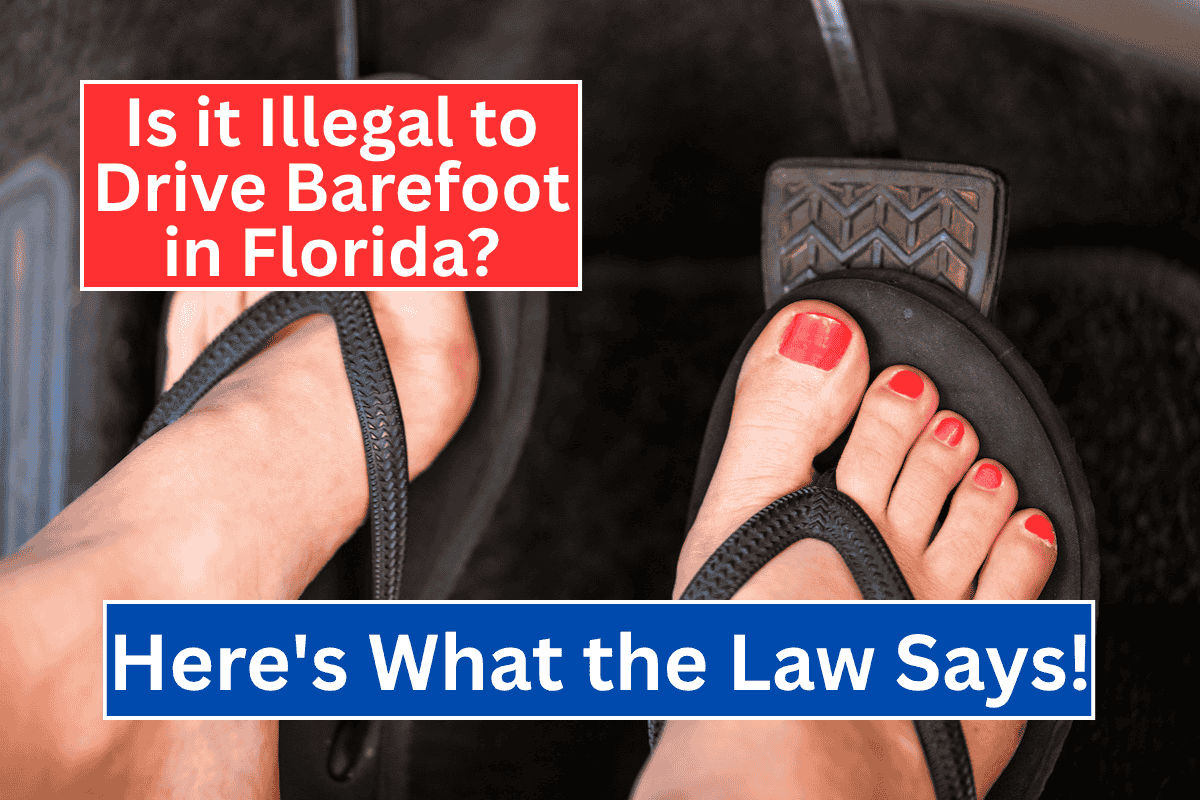Many drivers in Florida may have heard the rumor that it’s illegal to drive barefoot, but the reality is that it is not illegal to drive barefoot in Florida. In fact, no state in the U.S. has laws that specifically prohibit driving without shoes.
So, if you enjoy a relaxed day at the beach and want to hop in your car with sand between your toes, you’re in the clear! However, while it’s legal, there are some important safety considerations to keep in mind. Let’s break down the facts and safety tips for driving barefoot in Florida.
Why Do So Many Floridians Believe It’s Illegal to Drive Barefoot?
The belief that driving barefoot is illegal in Florida likely stems from a misconception that all states have similar rules about footwear while driving. Some states do have specific laws for motorcyclists requiring proper footwear, which may have led to confusion.
Additionally, there’s a possibility that the myth has been passed down through hearsay or misinterpretations of past experiences. In reality, Florida does not have any laws that make barefoot driving illegal, although other states may have different rules.
Why Is Driving Barefoot Not Recommended?
Although it’s legal to drive barefoot in Florida, it’s not the safest option. Here are a few reasons why you should consider wearing shoes while driving:
- Lack of Traction: When you drive barefoot, your foot may not have the proper grip on the pedals, making it harder to apply the right amount of pressure. This can lead to delayed braking or over-acceleration, both of which are dangerous and could cause accidents.
- Wet Conditions: If your feet are wet (or the pedals are), driving barefoot increases the risk of slipping. Wet conditions combined with bare feet can result in dangerous slip hazards on the accelerator or brake pedals.
- Injury Risk: If you’re involved in an accident while driving barefoot, you may suffer serious foot injuries due to broken glass or debris on the road. Shoes can provide some protection in case of such an incident.
- Loose Shoes in the Car: If you wear sandals, flip-flops, or open-toed shoes and take them off while driving, there’s a risk of your shoes becoming lodged under the pedals, blocking your ability to accelerate or brake effectively.
What About Open-Toed Shoes Like Flip-Flops?
While driving barefoot is not illegal, wearing open-toed shoes like flip-flops, sandals, or mules can also pose safety risks. Here’s why:
- Flip-flops and sandals can slip off easily or get caught under the pedals, especially if you’re making sharp turns or braking hard.
- High heels or wedges reduce your ability to pivot quickly between the brake and accelerator pedals, which can delay your reaction time in an emergency.
- Foot fatigue can also set in if you wear shoes that don’t provide good support, like flip-flops. This can distract you from driving and make it harder to control the vehicle.
Are There Alternatives to Closed-Toe Shoes?
If you prefer not to wear bulky closed-toe shoes, there are alternatives that can provide better traction and foot protection:
- Ballet flats or moccasins can offer adequate grip and comfort while being lightweight.
- Driving shoes are specifically designed to provide better pedal grip and comfort without sacrificing style.
These options give you the protection you need without the risk of wearing ill-fitting or dangerous footwear while driving.
What Happens If I’m In An Accident While Barefoot?
In Florida, reckless driving is defined as operating a vehicle in a manner that shows willful disregard for safety (Florida Statutes Section 316.192). If an officer believes that driving barefoot contributed to an accident, you could potentially be charged with reckless driving.
Reckless driving penalties in Florida may include:
- Up to 90 days in jail
- Fines ranging from $25 to $500
If you’ve been involved in an accident and charged with reckless driving due to driving barefoot, it’s crucial to contact a personal injury attorney. A lawyer can help you navigate the legal process and defend against any claims of negligence, potentially reducing penalties or charges.
In summary, it is not illegal to drive barefoot in Florida, but it’s not recommended for safety reasons. Shoes provide better control, traction, and protection while driving, reducing the risk of accidents and injuries.
If you do choose to drive barefoot, be mindful of the potential risks and consider opting for safer alternatives like driving shoes or footwear with good grip.
If you’ve been injured in a car accident caused by someone else’s negligence, or if you’re facing reckless driving charges, seek legal advice to ensure that your rights are protected and that you receive the compensation you deserve.












